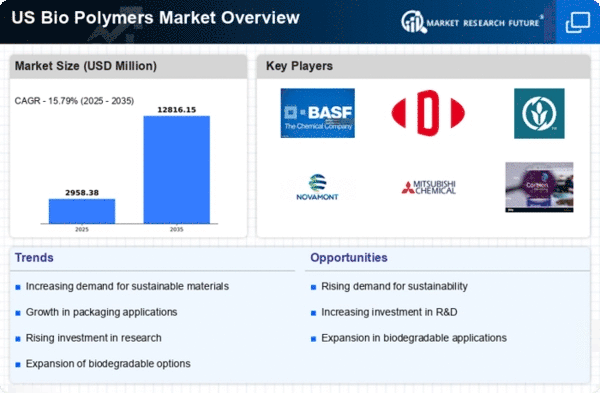The bio polymers market is currently experiencing a notable transformation driven by increasing environmental awareness and the demand for sustainable materials. As industries seek alternatives to traditional plastics, bio-based polymers are emerging as viable solutions. These materials, derived from renewable resources, offer a reduced carbon footprint and align with the growing consumer preference for eco-friendly products. The market is characterized by innovation, with ongoing research and development efforts aimed at enhancing the properties and applications of bio polymers. This evolution is further supported by regulatory frameworks that encourage the adoption of sustainable practices across various sectors. In addition to environmental considerations, the bio polymers market is influenced by advancements in technology and manufacturing processes. Companies are investing in new techniques to improve the efficiency of bio polymer production, which may lead to cost reductions and increased accessibility. Furthermore, collaborations between academia and industry are fostering the development of novel bio-based materials that can meet specific performance requirements. As the market continues to evolve, it appears poised for growth, driven by both consumer demand and regulatory support for sustainable alternatives to conventional plastics.
Rising Demand for Sustainable Packaging
There is a growing trend towards the use of bio polymers in packaging applications. This shift is largely driven by consumer preferences for environmentally friendly products. Companies are increasingly adopting bio-based materials to meet sustainability goals and reduce plastic waste. As a result, the The bio polymers market is witnessing a surge in demand for innovative packaging solutions. These solutions are both functional and biodegradable.
Technological Advancements in Production
Recent advancements in production technologies are enhancing the efficiency and scalability of bio polymer manufacturing. Innovations such as improved fermentation processes and enzyme technologies are enabling the creation of bio polymers with superior properties. These developments not only lower production costs but also expand the range of applications for bio-based materials, making them more competitive with traditional plastics.
Regulatory Support for Sustainable Materials
Government initiatives and regulations are increasingly favoring the use of bio polymers. Policies aimed at reducing plastic pollution and promoting sustainable practices are encouraging industries to transition towards bio-based alternatives. This regulatory support is likely to drive investment in the bio polymers market, as companies seek to comply with environmental standards and meet consumer expectations for sustainability.
















